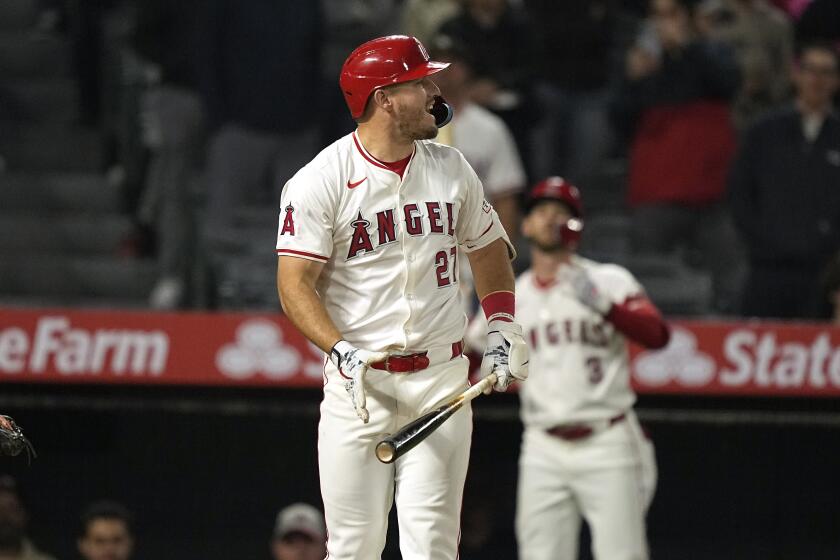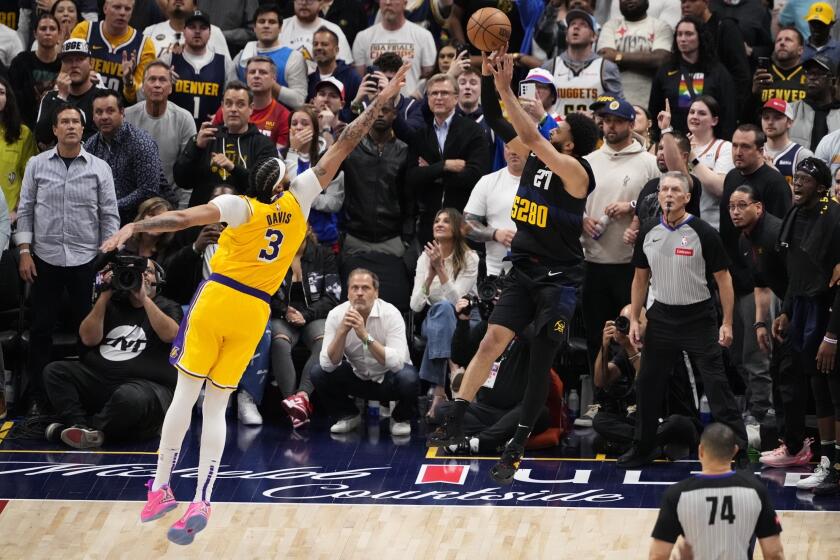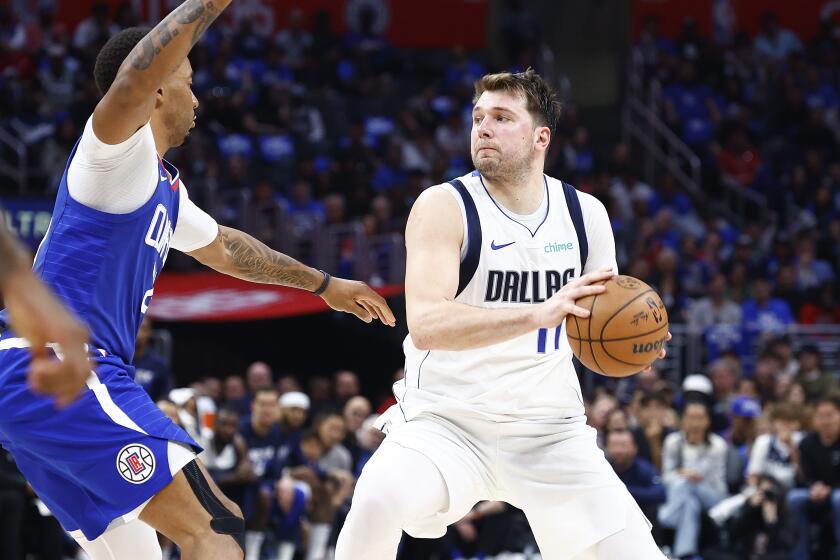The fall and rise of Josh Hamilton
“Drugs had destroyed my body and my mind and my spirit. I could no longer experience happiness or surprise. I couldn’t remember the last time I felt spontaneous joy. Why was I even alive?”
Josh Hamilton in his autobiography, “Beyond Belief”
WESTLAKE, Texas -- It was 2 a.m. when Josh Hamilton, strung out on crack cocaine, his once-robust 6-foot-4, 230-pound body withered to 180 pounds, most of his $3.96-million signing bonus squandered on booze and drugs, staggered up the steps to his grandmother’s house in Raleigh, N.C.
Homeless, dirty and barely coherent, Hamilton was a few days removed from a suicide attempt -- an overdose of pills -- and in the fourth year of a harrowing drug addiction that caused the former can’t-miss prospect to be banned from baseball for three full seasons.
It was Oct. 1, 2005, and Hamilton was a ghost of the player who would become a five-time all-star and 2010 American League most valuable player with the Texas Rangers.
In December, Hamilton signed a five-year, $125-million deal to be the Angels’ new right fielder and cleanup batter. Now 31, he is a high-risk, high-reward investment -- and not just because he tends to be a streaky hitter.
He is a recovering addict who has had two alcohol relapses, one in 2009 and another in January 2012; who is tested three times a week for drugs; and who travels with an “accountability partner” whose primary job is to help Hamilton resist the temptations that can derail his career and embarrass his team.
The Angels have assumed the risk because they believe Hamilton’s rare blend of power, speed and defense could help them end a three-year playoff drought.
But it was clear on that autumn night in North Carolina seven years ago that Hamilton was throwing his talent away.
“There were a lot of bottoms -- they just keep going deeper and deeper,” Hamilton recalled of his struggle, which included stints at eight rehabilitation centers. “It’s a cycle. You think, ‘OK, you’ve reached bottom,’ but actually, you haven’t. You can always go lower, to the point of death.”
Hamilton came close to that point before he was reborn.
Mary Holt, then 72, gave her grandson shelter and food. Hamilton went on smoking crack. Holt wasn’t going to let him die under her roof. After a few days, she issued an ultimatum: Do drugs again, you’re out.
Hamilton went to his room, his face burning with shame. He thumbed through his Bible and came across James 4:7: “Humble yourself before God. Resist the devil and he will flee from you.”
As he read that passage over and over, “[i]t grabbed my insides, my eyes watered up, I got on my knees and started talking to the Lord,” Hamilton said. “Emotionally, spiritually, physically, I felt hopeless. Using drugs behind my grandma’s back and being confronted by her, that was my lowest point.
“But when you feel the most hopeless, you’re the most willing to do whatever it takes. That was my moment of surrender.”
---
Hamilton pokes at a bowl of vegetable soup as he sits in the dining room of a country club set amid the lush, rolling hills of a tony Dallas-Fort Worth suburb. The jacket of his warm-up suit is zipped up his neck, concealing many of the 26 tattoos that are a reminder of his troubled past.
Blue flames run up Hamilton’s forearms. A devil is on the inside of his left elbow. An eyeless demon -- no eyes symbolizes a soulless being -- is on his right leg. Most were inked in the early days of his addiction.
It’s cold, gray and drizzly, but there are sweeping views of the private golf course and stately brick-and-stone mansions of the exclusive gated community where Hamilton resides with his wife, Katie, and four daughters, Julia (11), Sierra (7), Michaela Grace (4) and Stella (16 months).
It’s a far cry from the dirty trailer of a crack dealer where Hamilton once passed out, and those hazy, drug-addled moments in which he would, as he wrote in his 2008 autobiography, “wake up in the cab of my pickup truck, or in places I didn’t recognize with people I didn’t know.”
The details of his life can be ugly -- he once pawned Katie’s wedding ring for cocaine and burned through $100,000 on crack in six weeks -- but Hamilton doesn’t shrink from them. Telling his story, even for the umpteenth time, is a form of therapy.
“It helps me to talk about things,” Hamilton said. “It’s a reminder of how good God’s grace and mercy are, of where I was to where I am today. It keeps me humble.”
There was no history of addiction in Hamilton’s immediate family, which included working-class parents, Tony and Linda, and an older brother, Jason.
At Athens Drive High School in Raleigh, where he was named Baseball America’s national player of the year in 1999, “I never had a sip of alcohol, never tried tobacco,” Hamilton said. “I wasn’t a normal high school guy. I was focused on what I wanted to do, play baseball.”
After signing with Tampa Bay, which made him the first pick of the 1999 draft, Hamilton’s parents traveled with him for two minor-league seasons. But everything changed in the spring of 2001, when the family pickup was T-boned by a dump truck in Bradenton, Fla.
Hamilton injured his lower back. His mom, who was driving, suffered more serious injuries and returned home with his father.
Left alone, with plenty of money and free time, Hamilton, then 20, started hanging out at a Bradenton tattoo parlor, covering his body with ink and meeting people who took him to strip clubs and introduced him to alcohol and cocaine.
He compared his first line of coke with the adrenaline rush he felt when he hit a baseball 450 feet. He was hooked.
The back injury, a torn quad muscle and an elbow injury limited Hamilton to 83 minor-league games in 2001 and 2002. Then the drug suspensions started piling up -- six in all -- and Hamilton was barred from playing in 2003, 2004 and 2005.
“In 1999, baseball and my parents were the only two things I had,” Hamilton said. “When I was separated from them … I started looking for things to fill that hole.”
Amid cycles of heavy drug use, attempts at sobriety and relapse, Hamilton managed to court and, in 2004, marry Katie Chadwick, a former classmate.
But by the summer of 2005, Josh and Katie, pregnant at the time with Sierra, were separated. Furious with and fearful of her husband, Katie secured a restraining order against him.
“I thought God would use the birth of our daughter to snap him out of his addiction,” Katie said. “When it didn’t, I was at a loss. I had a lot of anger, bitterness and resentment toward Josh.”
She sought counsel from her pastor, and after airing a long list of grievances about Josh, Katie was stunned by the advice she received.
“He said I needed to forgive him,” Katie said. “I was like, ‘No way, are you kidding?’ He said by sitting home and replaying everything Josh had done, it was affecting me, not Josh. He was right.”
Josh was at his grandmother’s house when Katie called.
“It immediately took all those feelings of bitterness and anger away from me,” Katie said. “If you hold unforgiveness against someone … it strangles you. But when you forgive, you cut it.”
Asked if they would be married today without that call, Josh and Katie respond in unison: “Oh, no.”
---
The road back began with a newspaper article in which Hamilton, newly sober, in decent health thanks to his grandmother’s cooking and encouraged by a Duke University psychiatrist, said he’d like to play baseball again.
Former Rays minor-league coach Roy Silver, who with Randy Holland runs a Christian-based baseball academy in Clearwater, Fla., saw the story and invited Josh to live, work and train at their facility, called the Winning Inning.
Hamilton accepted, and in January 2006, he left Raleigh for Tampa.
“He pulled up in his truck with a bicycle and a couple of fishing rods in the back,” Silver recalled. “He had his hat pulled down over his eyebrows, he was smoking cigarettes, his skin was not a good color. He gained his weight back, but he didn’t look too far removed from his last binge.”
For five months, Hamilton slept on an air mattress. He cleaned toilets, mopped floors, cooked meals, cut grass and raked dirt to earn time in the batting cage and on the field. He attended a weekly Bible study and worked with kids. He began to put his priorities -- and his life -- back in order.
“When he lost that identity of Josh the baseball player, he crashed and took on the identity of a drug addict,” Silver said. “We wanted to get him to where he could be a husband and a father again.”
Hamilton said he grew spiritually and mentally under Silver and Holland. He began patching things up with Katie, who made several visits to Florida. Major League Baseball took note of Hamilton’s progress, and on June 20, 2006, granted his request for reinstatement.
“It was very emotional,” Hamilton said. “I broke down with Katie and cried.”
After a 15-game minor-league stint that summer, the Rays did not protect Hamilton on their 40-man roster. He was selected by the Chicago Cubs in the Rule 5 draft and traded to Cincinnati, where he hit .292 with 19 homers and 47 RBIs as a rookie in 2007.
That winter, the Rangers traded their top pitching prospect, Edinson Volquez, to Cincinnati for Hamilton, but not without a lengthy background check -- and some consternation.
“We talked with people who knew him personally, who worked with him in Tampa Bay and Cincinnati,” Texas General Manager Jon Daniels said. “We talked to doctors about addiction -- what is the impact of treating your body like that for years? In the end, we had a guy in the room who said Josh has a chance to be an MVP. It was a classic risk-reward deal, but he instantly changed who we were.”
Hamilton was a cornerstone player for five years, averaging 28 homers and 101 RBIs despite missing significant time because of injuries. He led Texas to the 2010 and 2011 World Series.
The Rangers also hired former Reds coach Johnny Narron to be Hamilton’s accountability partner, a combination chaperon/advisor/confidant. The two shared apartments in spring training and had adjacent hotel rooms on the road.
“But it’s not like it’s foolproof,” Daniels said.
Narron was living with Hamilton in January 2009, when Hamilton sneaked out the apartment window and drank alcohol at a Tempe, Ariz., bar. Hamilton and the Rangers concealed the incident until, seven months later, photos of Hamilton cavorting with three young women at the bar appeared on the Internet.
In January 2012, after Narron took a job with the Brewers, Hamilton drank alcohol at a Dallas bar. This time, as news of the relapse began circulating on Twitter, Hamilton issued an immediate apology to his family and team.
“It’s like someone who is missing a limb -- it’s not there anymore, but every once in a while you feel like you have an itch,” Hamilton said of his urge to drink. “The thing is, you can’t scratch it.”
Within days of the Dallas incident, the Rangers hired Shayne Kelley as an accountability partner, and the former Alabama football chaplain will follow Hamilton to Anaheim. Josh and Katie also underwent extensive counseling.
“It boils down to self-responsibility, accountability and choices,” Hamilton said. “People worry about me going to big cities, having money, but if you want to do something stupid, you can do it. But God has shown me how I get to the spot where I make a decision I shouldn’t make.
“Taking a day off from Him can turn into a week, two weeks, a month. When I have my guard down spiritually, I withdraw from people in my support system, and it gets to a point where I do something impulsive.”
Though he relapsed twice in four years, Hamilton has never failed a drug test, and the highs on the field, where Hamilton has always had a knack for the dramatic, have outweighed the lows off it.
There was the memorable 2008 Home Run Derby, when Hamilton electrified Yankee Stadium with a 28-homer barrage in the first round, and his .350-hitting, four-homer, seven-RBI performance in the 2010 AL championship series against the Yankees.
There was the 10th-inning homer to give Texas a lead over St. Louis in Game 6 of the 2011 World Series -- the Rangers eventually lost -- and that historic night in Baltimore last May 8, when Hamilton became the 16th major leaguer to hit four homers in a game.
“Those are the kinds of things where you think, ‘Of course it happened to Josh,’ ” Daniels said, “because it fits the movie script.”
And there is an actual script. Last winter, Hamilton signed with Thunder Road Pictures for a movie about his life that will be written and directed by Casey Affleck.
“It’s set up pretty good, isn’t it?” Hamilton said with a grin. “And the story is not close to being over.”
twitter.com/MikeDiGiovanna
Wednesday: The Angels’ signing of Josh Hamilton was a risk beyond his history of addiction. His on-field production has also been streaky, and he bombed at some key times last season.
More to Read
Get our high school sports newsletter
Prep Rally is devoted to the SoCal high school sports experience, bringing you scores, stories and a behind-the-scenes look at what makes prep sports so popular.
You may occasionally receive promotional content from the Los Angeles Times.







